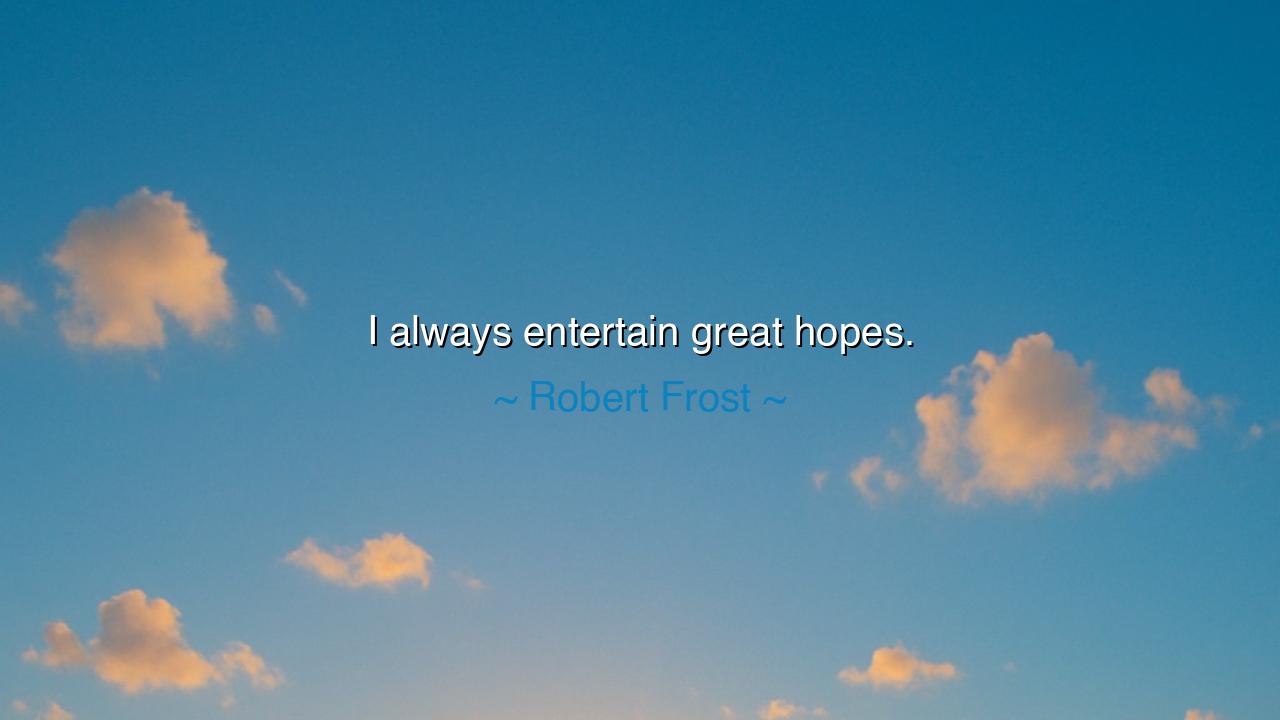
I always entertain great hopes.






“I always entertain great hopes.” Thus spoke Robert Frost, the poet of the quiet fields and the restless heart, whose verses captured the majesty of ordinary life and the quiet heroism of endurance. At first glance, this saying seems simple — a whisper of optimism from a man who saw beauty in the everyday. But beneath its calm surface lies a deeper current of wisdom: that hope, far from being mere wishful thinking, is the eternal companion of those who labor in darkness, the flame that keeps the human spirit from surrendering to despair.
To entertain great hopes is not to live in illusion, but to live in courage. Hope, as Frost knew, is not a passive dream; it is an act of defiance. It is the steadfast belief that beyond the winter lies spring, beyond the struggle lies renewal, and beyond the unknown road lies the promise of discovery. Frost, who walked the solitary paths of New England and of the soul, understood that life often presents choices — hard, uncertain, and lonely ones. Yet in every fork in the road, he carried with him the quiet assurance that the journey was still worth taking. His hope was not naive, but resilient, born from hardship and shaped by wisdom.
Frost’s life itself was a testament to the power of great hope. Before he became one of America’s most beloved poets, he faced poverty, failure, and the loss of family. He struggled for years in obscurity, publishing poems that went unnoticed, teaching in small schools, tending to farms that yielded little but debt. Many would have yielded to bitterness, but Frost kept writing — kept believing that his words would one day find their place in the world. And so they did. When his first collection, A Boy’s Will, was finally published, it carried within it the echo of a man who had never ceased to believe that beauty could be wrested from struggle, and meaning from pain.
In his quiet defiance, Frost mirrors the spirit of all who have triumphed through endurance. Think of Nelson Mandela, who, after twenty-seven years of imprisonment, emerged not with vengeance but with vision — holding not hatred, but hope for reconciliation. Like Frost, Mandela knew that to entertain great hopes is to refuse despair even when reason suggests it. Hope, to such souls, is not a fragile candle flickering in the storm — it is the fire that turns suffering into strength, and darkness into dawn.
But Frost’s words carry another, subtler meaning. To entertain great hopes is not merely to possess them, but to welcome them as honored guests — to make a home for them in the heart. Hope must be cultivated, tended like a garden, even when the soil is barren. It is easy to hope when life is kind, but the true art is to hope when the night is long and no light is in sight. Frost’s hope was not idle; it was discipline. It was the practice of keeping faith with one’s purpose, of trusting that the unseen future would justify the unseen effort.
There is wisdom here for all who labor quietly in their own fields — for the artist, the dreamer, the builder, the parent, the teacher. Each must hold their great hopes close, for the world often mocks what it does not yet understand. The seed must endure the cold before it blooms. Frost teaches us that greatness begins not in certainty, but in the brave act of hoping against the odds — of believing that one’s work, though small and unseen, may yet contribute to something eternal.
So, my children, learn this: to hope greatly is to live greatly. Guard your hope as you would a sacred flame. Feed it with effort, shield it with patience, and let it guide you when the road is dim. When the world grows weary and doubt whispers its poison, remember Frost’s simple creed: “I always entertain great hopes.” For he who hopes, even in defeat, stands taller than he who despairs in victory.
And thus, let your heart be like his — unbroken, unhurried, unwavering. Dream, though the dream be distant. Strive, though success be uncertain. Believe, though the night be long. For hope is the song of the soul that refuses silence, the eternal promise that no winter lasts forever. And as long as you, too, entertain great hopes, you will never walk alone through the dark — for within you will burn the same immortal flame that guided Frost through the shadows, toward the dawn.






AAdministratorAdministrator
Welcome, honored guests. Please leave a comment, we will respond soon